- Home
- Clair W. Hayes
The Boy Allies with the Terror of the Seas; Or, The Last Shot of Submarine D-16 Page 2
The Boy Allies with the Terror of the Seas; Or, The Last Shot of Submarine D-16 Read online
Page 2
CHAPTER II.
THE D-16.
The British submarine D-16 was, at this time at any rate, the onlyunder-the-water vessel that could remain under the sea indefinitely. Theone real weakness of beneath-the-sea fighters had always been theirinability to remain long under water, and for this reason they couldoperate only within a certain radius of their base.
In discovering that there was a means by which a submarine could remainindefinitely under water, Sir John H---- had overcome this difficulty.The new invention had been tried on the D-16, and it had worked.
According to Sir John, a submarine in order to remain submergedindefinitely, must be able to extract air from the water, as does afish, for it is air that is needed most under water. Up to the time ofSir John H----'s discovery this had never been accomplished.
Reasoning that it must be a peculiarity about the gills of a fish thatpermitted it to extract air from the water, Sir John had experimentedalong this line, and his experiments finally terminated successfully.When the D-16 had proved the practicability of Sir John's theory, thevessel had immediately been put into commission, and the construction ofothers begun.
The secret of the D-16 was known to only a trusted few besides the crewof the vessel--the King, Winston Churchill, and David Lloyd George,Chancellor of the Exchequer. Besides her ability to remain submerged,D-16 was also many knots faster than any other submarine.
From a naval viewpoint, perhaps, the war up to this time had notprogressed as favorably as had been expected. While the allied forces onthe continent had been hemming in the Germans and their allies, drivingthem back from beneath the very walls of Paris, back across the Marneand across the Aisne, and while the legions of the Czar had beenattempting to force a passage of the Carpathian mountains for aninvasion of Hungary and Austria, and making determined assault withinthe borders of East Prussia, the British, French and Russian fleets hadbeen practically inactive.
True, there had been several important naval battles, but none whichcould be called decisive, although whatever advantage there was was withthe British.
The French, with the Austrian fleet cooped up in their base in theAdriatic, had little to do but to see that the Austrians were notallowed to escape. The Russian fleet had had one or two brushes with theTurks, but these were unimportant.
In the North Sea England was having more difficulty. German submarines,from their base at Ostend, had made several successful raids into Doverharbor, on the British coast; three unfortified towns on the coast hadbeen razed by German shells and German aeroplanes had been seen flyingabout in the vicinity of London.
Huge Zeppelin balloons, upon which, England believed, the German Emperorplanned to risk all should other means fail, had been seen over theBritish Isles, but had been driven off. One had been sunk. After this,England, ever fearful of an air raid, took heart, and agreed with thenobleman who said that a raid by air was not feasible.
Besides the ships of war that had been sunk by the Germans, Britishmerchant vessels had also been sent to the bottom by the enemy'ssubmarines.
But the main German fleet was cooped up in Heligoland and in the Kielcanal by the British blockade, which, in itself, was proof positive ofGreat Britain's naval supremacy. The Kaiser had no mind to give openbattle to England on the sea.
This was the situation, then, when submarine D-16 set forth from London,to do, with her new power, what damage she could to the enemy's fleet.
One day, while the lads had been looking over the vessel, as she lay indrydock, they had seen a man run furtively from the place as theyapproached; but they were unable to catch him. A second time they hadseen him, though not close enough to identify him.
Although both had thought considerably of the matter, neither hadmentioned it to the other, and it had been allowed to drop. Nor had theycome upon the man again before they put to sea.
The sinking of the German vessel related in the first chapter had beenthe first venture of the D-16, and now the vessel was heading toward thecoast of England again, having gone as far toward the strong fortress ofHeligoland as Lord Hastings had deemed advisable at that time.
All day the little vessel continued on her way, traveling upon thesurface, for there was now no need to submerge. She went very slowly,and night found her not many miles from the scene of her firstencounter.
A sharp lookout was kept for some sign of an enemy, but there was none.
With the coming of the first light of day, Jack and Frank ascended thebridge together, and turned their eyes toward the west. A faint cloud ofsmoke on the horizon gave evidence of a ship of some sort.
"Probably a British vessel," said Jack.
"Can't tell," returned Frank. "A German cruiser may have succeeded inrunning the blockade and getting in behind."
"That's true, too," Jack agreed. "It's a mystery to me how they do it.England is supposed to have them safely bottled up. It's beyond me howthey get out."
"It's beyond me, too. Of course, it's easy enough for the submarine; butyou'd think we'd be bound to spot a big cruiser."
"Something will have to be done, sooner or later. What's the use of ablockade if it doesn't blockade?"
"Well," said Frank dryly, "I have no doubt that if you have a plan, theadmiralty would be glad to know it."
"I haven't any plan; but England will have to do something. That'scertain."
"There is no question about that. Hello!"
"What's up?" asked Jack, looking at his friend in some surprise.
For answer Frank pointed toward the east. Jack peered intently into thedistance and also uttered an exclamation of surprise.
"Germans?" he asked.
"Must be," replied Frank briefly.
He glanced ahead again. Then turned to his friend with an exclamation ofsatisfaction.
"If they are," he said, "they'll get more than they bargained for thistime."
For what his eyes had made out, through his glass, was the outline offive large battle cruisers, convoyed by a flotilla of torpedo boats.
"British?" asked Jack eagerly.
"Look like it," replied Frank, "but I can't tell for sure."
It was plain to both lads that neither fleet had made out the presenceof the other, and both--the one from the West and the one from theEast--were steaming directly toward the little submarine, which laysquarely between them, though out of sight, because she sat so low inthe water.
"Call Lord Hastings," said Jack, and Frank hastened to obey.
A moment later the commander of the D-16 appeared on the bridge. He tookin the situation at a glance.
"The fleet to the east is German," he said, after a careful scrutinythrough his glass, "and the other must be the British fleet commanded byAdmiral Beatty."
"Then there will be a fight," said Frank.
"There will be unless the Germans perceive our ships soon enough to givethem a chance to escape," returned Lord Hastings. "Another hourundiscovered, however, and we'll get them sure, for if I am notmistaken, the leading British ships are the _Lion_ and the _Tiger_--thefastest cruisers afloat today. Also their guns are greatly superior tothose of the enemy."
"But what are we going to do?" asked Frank, somewhat impatiently. "Weare not going to stand by and look on, are we?"
Lord Hastings smiled.
"Don't you worry," he said quietly. "We'll take our part, whatever itmay be. We'll go below now."
The three descended. The conning tower and bridge were closed behindthem, and soon the tanks were opened. The D-16 submerged until the topof her periscope barely protruded above the edge of the water.
Lord Hastings, Frank and Jack took turns watching the approach of thetwo fleets, now that they were in range of the periscope; and it waswhile the latter was at the instrument that sudden signs of commotionbecame noticeable on the German vessels. At the same instant Jackperceived that the British ships had increased their stride, and weremaking directly for the Germans.
"
They have sighted each other, sir," he cried, turning to Lord Hastingsin great excitement.
Lord Hastings sprang to the periscope.
"And the Germans are turning to run," he said, after a quick glance.
It was true. The German commander, realizing that he was probably nomatch for the powerful British squadron, had no mind to give battle whenthe odds were as nearly even as they were now. Evidently he had moreconfidence in the power of his enemy than he had in his own. Therefore,immediately the British fleet was sighted, he gave the command to comeabout and make for the protection of the mined area about Heligoland atfull speed.
But the time lost in coming about was to prove a severe blow to theGermans. The British fleet, led by the _Tiger_, Admiral Beatty'sflagship, had sighted its prey, and was making after it at full speed.
"Guess we might as well take a hand in this," remarked Lord Hastingscoolly. "Submerge another five fathoms, Mr. Templeton."
More water was let into the tanks and the D-16 dropped rapidly lowerinto the sea.
"Full speed ahead, Mr. Templeton," came the next command.
The D-16 seemed to leap forward like a live thing, as she dashed inpursuit of the fleeing German fleet.
"More notches for the table, I guess," said Frank to Jack.
"We'll see," was the latter's reply. "I hope so."

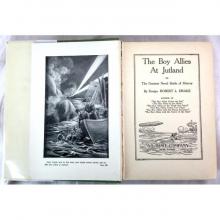 The Boy Allies with the Terror of the Seas; Or, The Last Shot of Submarine D-16
The Boy Allies with the Terror of the Seas; Or, The Last Shot of Submarine D-16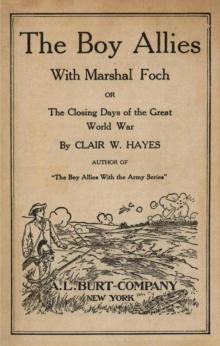 The Boy Allies on the North Sea Patrol
The Boy Allies on the North Sea Patrol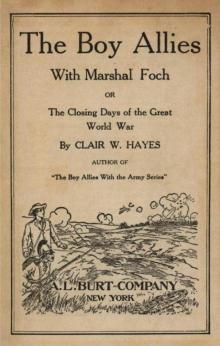 The Boy Allies in the Baltic; Or, Through Fields of Ice to Aid the Czar
The Boy Allies in the Baltic; Or, Through Fields of Ice to Aid the Czar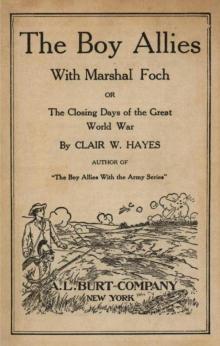 The Boy Allies with Marshal Foch; or, The Closing Days of the Great World War
The Boy Allies with Marshal Foch; or, The Closing Days of the Great World War Boy Allies with Haig in Flanders; Or, the Fighting Canadians of Vimy Ridge
Boy Allies with Haig in Flanders; Or, the Fighting Canadians of Vimy Ridge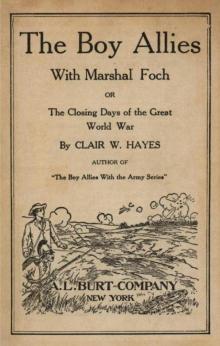 Boy Allies with the Victorious Fleets; Or, The Fall of the German Navy
Boy Allies with the Victorious Fleets; Or, The Fall of the German Navy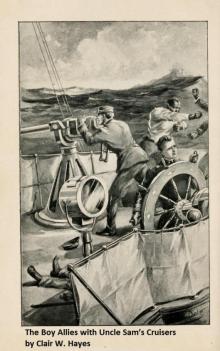 Boy Allies with Uncle Sam's Cruisers
Boy Allies with Uncle Sam's Cruisers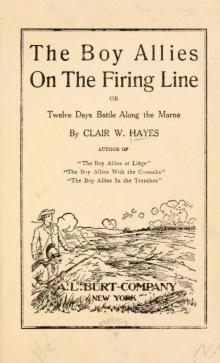 Boy Allies at Liège; Or, Through Lines of Steel
Boy Allies at Liège; Or, Through Lines of Steel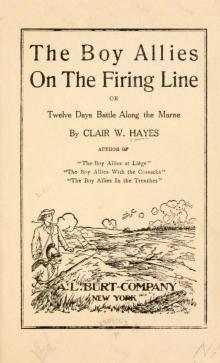 Boy Allies on the Firing Line; Or, Twelve Days Battle Along the Marne
Boy Allies on the Firing Line; Or, Twelve Days Battle Along the Marne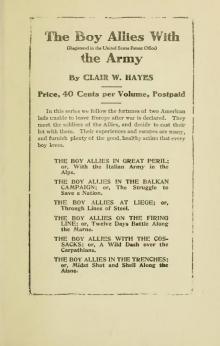 Boy Allies in the Balkan Campaign; Or, the Struggle to Save a Nation
Boy Allies in the Balkan Campaign; Or, the Struggle to Save a Nation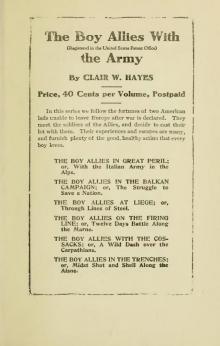 Boy Allies in the Trenches; Or, Midst Shot and Shell Along the Aisne
Boy Allies in the Trenches; Or, Midst Shot and Shell Along the Aisne Boy Artist.
Boy Artist.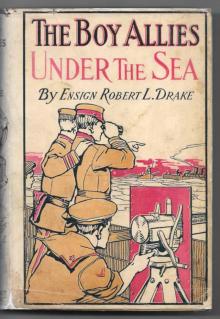 Boy Allies Under the Sea; Or, The Vanishing Submarines
Boy Allies Under the Sea; Or, The Vanishing Submarines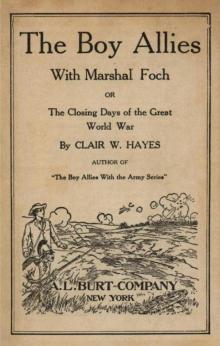 Boy Allies under Two Flags
Boy Allies under Two Flags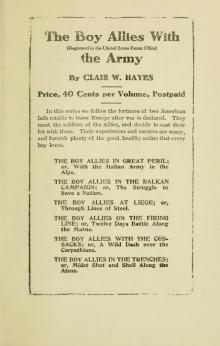 Boy Allies in Great Peril; Or, With the Italian Army in the Alps
Boy Allies in Great Peril; Or, With the Italian Army in the Alps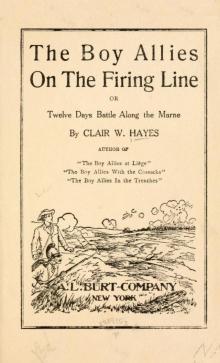 Boy Allies with the Cossacks; Or, A Wild Dash over the Carpathians
Boy Allies with the Cossacks; Or, A Wild Dash over the Carpathians